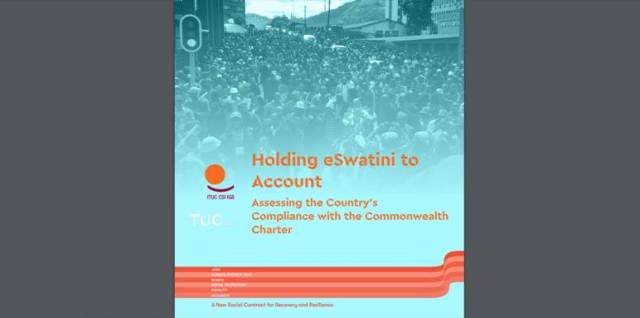
In June, protesters marching to deliver petitions calling for democratic reforms to the African country of eSwatini were attacked by police and the military resulting in the deaths of at least 70 people and the injury of hundreds more.
This was the most violent of a series of human rights abuses and incidences of oppression this year by the eSwatini government. eSwatini – Africa’s last remaining absolute monarchy – is currently facing many crises including high unemployment, rising poverty and the COVID-19 and HIV pandemics. The ability of the eSwatini government to deal with these crises is severely undermined because it is mired in corruption, brutalises its citizens and suppresses civil society.
A report commissioned by TUC Aid, the charitable arm of the Trades Union Congress in Great Britain, in partnership with the eSwatini trade union movement TUCOSWA and with support from the International Trade Union Confederation (ITUC) and ITUC Africa, makes the case for the Commonwealth and the international community to hold the eSwatini government to account.
Holding eSwatini to Account: Assessing the Country’s Compliance with the Commonwealth Charter outlines many egregious breaches of the Commonwealth Charter by the eSwatini government. The failure of the government to meet the Charter’s obligations on democracy, equality, freedom, human rights and good governance is set out clearly and forensically.
It uses evidence from various sources including powerful individual testimonies which reflect the lived experiences of workers, trade unionists and civil society members.
Their voices are unequivocal: eSwatini is failing to comply with its Commonwealth Charter commitments and obligations. The Commonwealth has not held eSwatini to account for its violations, and the situation in the country is deteriorating.
eSwatini’s failure to adhere to the basic principle of democracy, by allowing political parties to operate in the country, remains unaddressed. According to testimonies in the report, the government also regularly interferes in local elections and other processes. One example is highlighted in the testimony of Lucky Dlamini, from the Swaziland United Democratic Front, concerning the Matsapha Town Council. “The people elected their council representatives, but the Minister of Housing unilaterally disbanded the councillors – despite them being elected through popular vote. This would not happen in any normal democracy.”
The report details the systematic undermining of the rule of law and judicial independence by the government, and a failure to root out corruption. Freedom of expression is severely curtailed, with the media firmly under the control of the King.
According to Transparency International’s 2019 corruption perception index, eSwatini ranked 113 out of 180 countries. This is a worse ranking than in 2018, indicating that the country is going in the wrong direction in the fight against corruption.
The government’s active discrimination against individuals based on their sexual orientation and gender identity is a clear breach of the Charter’s human rights principle which decries “all forms of discrimination”.
The rights of women and girls lag far behind their male counterparts, with numerous examples of discrimination and marginalisation. Gender-based violence is a substantial problem. A national survey in 2018 found that one in three girls had experienced sexual violence by the age of 18. eSwatini has one of the highest prevalence of HIV in the world, and women have been shown to be disproportionately affected by the epidemic. This vulnerability is said to be the direct result of “gender inequality within eSwatini’s society”.
The brutal suppression of the right to association and assembly highlights the lack of tolerance facing individuals, trade unions and civil society.
The government’s brutality is underscored by Mduduzi Gina, TUCOSWA Secretary General, who says in the report: “In a case on 24 August 2018, teachers attending a meeting of the Swaziland National Association of Teachers were violently dispersed by the police. One teacher, Willy Dlamini, was shot in the hand by the police.”
Overall, it is clear that the principles and values laid out in the Commonwealth Charter are not being reflected in the lived experiences of the people of eSwatini.
It is the view of the Commonwealth Trade Union Group that these breaches need to be investigated urgently by the Commonwealth Ministerial Action Group (CMAG), the body empowered by the Commonwealth to uphold its values, and, if not resolved, eSwatini’s membership of the Commonwealth should be suspended.
Taking those steps would indicate that CMAG was serious about its duty to enforce the Commonwealth Charter in full, which is a point of concern to many in the Commonwealth. Too often, CMAG has acted only against countries where the democratic government has been overthrown, which is of little help in a country like eSwatini where there is no democratically elected government in the first place.
The people of eSwatini have called for an end to violence and for the implementation of democracy in their country. It’s time for the eSwatini government and the international community to heed their call.
Report: Holding eSwatini to Account: Assessing the Country’s Compliance with the Commonwealth Charter
Owen Tudor is with the Commonwealth Trade Union Group and is Deputy General Secretary of the International Trade Union Confederation. Views expressed in articles do not reflect the position of the Round Table Editorial Board.



